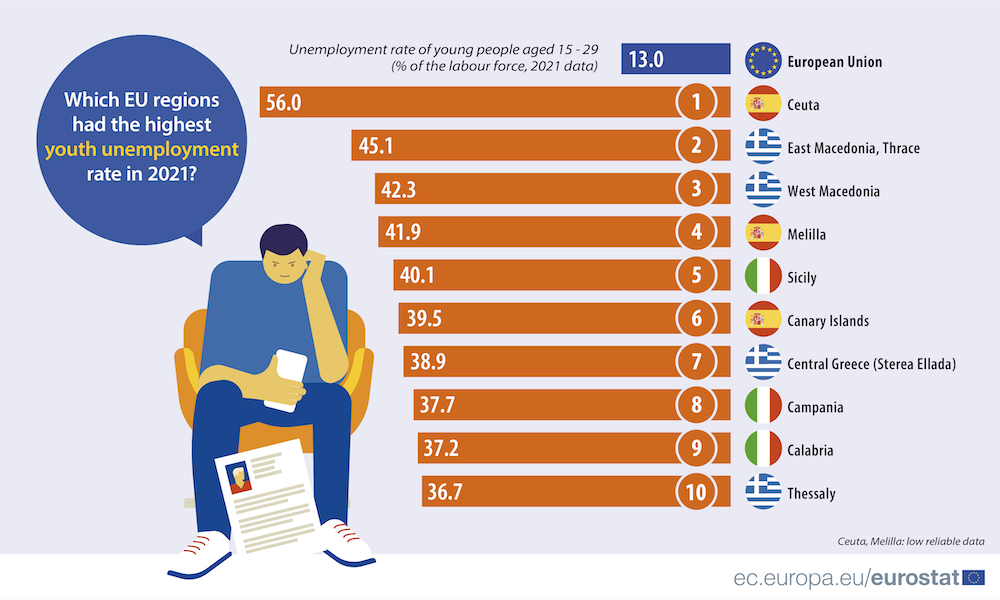(Editor’s note: This post about moving to Italy is the sixth in a series looking at the best countries in Europe for American expats. You can read the introductory post here.)
Between my travels, family ties, Italian friends, studies, and work I have spent a lot of time in Italy. Italy is a magnificent and fascinating place to visit and study. Think of the Romans, the Venetian Empire and the Renaissance.
But let me tell you, it is not easy to find a job there and make a living.

Low wages and high unemployment
One of the most significant issues is that overall unemployment is high and youth unemployment is very high. They both have been for as long as I can remember. Also, salaries are low there, too, so you need
something to motivate you more than money and likely another form of support. More on that below.
As of December 2022, Italy had the highest rate of unemployment out of all the 27 European Union countries, according to Statista.com. The Netherlands and Germany were ranked the best and the fourth-best, respectively.
Median household Income in Italy in 2022 was 35,189 euros, according to global data.com.
Since it is not easy even for Italians, just imagine trying to make it if you are an outsider without any personal connections! Additionally, Italians often live with their parents until they get married, and sometimes never move out because they don’t make enough to live independently.
At various times since graduating with a bachelor’s and a master’s in Italian, I have tried to find a job in Italy with a living wage. The one time I was successful was when an outside organization paid my salary.
Here are a few tips for Expats trying to make it happen:
Teach English
My first thought was to teach English since I am a native speaker, but what I didn’t know at the time was that if Italians wanted a native English speaker, they would typically hire an English teacher from England. British English was more sought after than American English given their geographical proximity. So, if you were from the United States, Canada, Australia, New Zealand or Ireland, you were farther down the list.
I remember asking a professor friend of mine if there were opportunities to teach English and she said they paid their current lecturers 1,000 euros per course, which I knew I could not live on.
Also, in recent years, plenty of Italians have lived or studied in English speaking countries, so they would also be competing with you, teaching in high schools or lower grades or at universities. If you wanted to make the big bucks, you needed to go to Japan or Korea or the Middle East, for example.

Work for an international company or organization
My second thought was to work for a company or organization with offices in Italy. For example, one friend who was working as an engineer in the U.S. had the good fortune to find a great job in Italy because his company had an office in Milan. He could move to – and work in – Italy while staying with his current company.
Another idea I had was to get a job with an international organization, such as the United Nations, which has many opportunities in Italy including three in Rome (United Nations Food and Agriculture Organization, the World Food Programme and the International Fund for Agricultural Development.
Two non-Italians I know found jobs at foreign universities – one an American professor who taught at an American liberal arts college in Rome and a Canadian graduate student who did administrative work at an international school in Florence.
Be a digital nomad
My third thought was to be a digital nomad. I have a couple of remote gigs, which means I can theoretically live and work anywhere in the world—I just have to pack my laptop, keyboard and mouse. But the reality is that there are other essential things – health care, taxes, visas, permissions to stay, etc. – to consider. And being a Digital Nomad in Italy is still not an official thing, though it is possible that could change in September 2023.
Check out Dispatches Europe for the latest info on Italy.
It’s about people, not money
So here is a question: How do the Italians survive with high unemployment and low salaries?
They value and appreciate people and value human relationships. They live with their family, sometimes
for a very long time. They pool their resources. For example, you may make wine, your neighbor may grow arugula, and you exchange what you have. Italians are careful with their money. They also value the simple things in life, like getting together for un caffè (an espresso).
Housing costs and overall cost of living
Like anywhere else in the world, housing costs and the overall cost of living are higher in cities and lower in the surrounding areas, but Italian cities do not appear in the Top 20 most expensive cities to live in.
Percentage of English speakers
In the big cities and touristy areas, you will find that people speak English. According to Higher Language.com, between 30 percent and 34 percent of the population speaks English. So if you are not off the beaten path, you should be okay.
But it is not like northern Europe. Having some basic Italian will help you.
Historically, Italians studied French as a foreign language, but more recently they have switched to English.
The Agony and the Ecstasy
When I read Irving Stone’s biographical novel of Michelangelo Buonarroti, “The Agony and the Ecstasy,” I realized that even one so talented and prolific as Michelangelo had a tough time working in Italy. He wanted to do what he was passionate about, and therefore he was at the mercy of his patrons.
If you don’t have an EU passport – and even if you do – I recommend working elsewhere unless you can get an income from a non-Italian organization, company or university.
Is your passion more important than what you earn? Are people more important to you than money? Well then, go for it!
Otherwise, I suggest finding another country, such as Germany, which is actively seeking workers.
––––––––––
You can read more here about our journey to becoming DIY expats.
You can see information on moving to Italy here.
You can see information about moving to France here.
You can see information about moving to the Netherlands here.
You can see Mary’s post about Germany here.
See Chris Loar’s post about moving to Berlin here.
Mary Porcella is a Europhile who has lived in Germany, Norway, Italy, and the U.S. She is a writer, editor, and photographer. She loves seeing new places, returning to old haunts, and meeting up with family and friends. As of today, her travels have taken her to 20 European countries, and she hopes to visit the rest.















